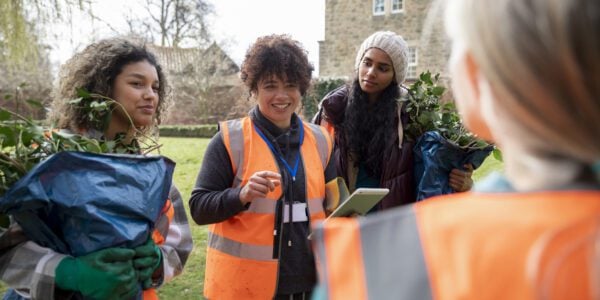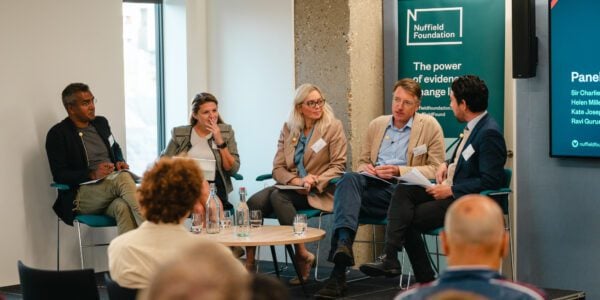The presence of a graduate in private, voluntary and independent early years settings – which include nurseries, pre-schools and childminders – demonstrates a small but positive association with young children’s educational attainment. This is according to new Nuffield-funded research from the Education Policy Institute.
Using a model that controls for children’s characteristics, and drawing on data spanning over a decade covering over 6 million children, the detailed study finds that modest improvements in child outcomes were seen across several years of data and among graduates with different qualifications.
Significantly, the improved learning outcomes of young children persisted as they made their way through primary school, and remained at age 11.
The new report also finds that the association between a child attending early years settings with a graduate and improved outcomes is twice as strong for those children who spend more hours in settings – strengthening the case for the extension of the government’s 30 hours free childcare offer, so that it is open to all families.
While the new findings indicate a positive impact from graduates, the report also demonstrates that their presence is far from a “silver bullet” for improving young children’s attainment – this is also driven by a range of other factors in the early years, school and home environment. Early years graduates are also currently in very short supply: on average only one staff member in private, voluntary and independent early years settings has a degree.
In light of this, EPI urges the government to focus on a strategy to boost the quality of the whole early years workforce, while also focusing on improving graduate take-up. It also calls for a review of early years degrees, to explore how they can be enhanced.
These recommendations follow the publication today of separate research from EPI, led by researchers at the University of Plymouth and supported by the Nuffield Foundation, which demonstrates how early years degrees currently on offer are highly variable and difficult for students and employers to navigate.
Key findings
- There is a small but positive association between the presence of a degree-qualified early years worker and children’s learning outcomes, as measured at age five by the Early Years Foundation Stage Profile (EYFSP) – the statutory assessment used to determine young children’s attainment.
- The association between degree-qualified early years professionals and children’s outcomes corresponds to an additional third of an EYFSP point score. These results are modest compared to other factors (for example, the gap between an autumn-born child and a summer-born child is 4.3 EYFSP points), but they are evident across types of degrees. The two main types of qualifications available today, Qualified Teacher Status (QTS) and Early Years Teacher Status (EYTS), demonstrate this positive association.
- Significantly, the association with positive learning outcomes is sustained as a child enters primary school, showing that improvements in the early years are sustained up until at least the age of 11. This challenges claims that the benefits of early childhood interventions fade as children grow older.
- The more modest improvements in outcomes shown from the presence of a graduate are not unexpected, given young children’s outcomes are driven by a range of other factors in the early years, in school and at home. Likewise, while the presence of a graduate appears to be a positive, they alone are unlikely to generate wholesale changes to the quality of provision, given the poor conditions faced by the workforce overall.
The link between a child attending early years settings with a graduate and higher attainment scores is bolstered if the child spends more hours in early years education
- Young children who spend more than 15 hours in early years settings appear to see more benefits from the presence of a graduate than those attending for fewer hours.
- This association is unlikely to be merely driven by the fact that children from wealthier backgrounds are more likely be in early years settings for longer hours – the analysis also shows that the positive association is still present when focusing on the most disadvantaged children.
- These findings have important implications for the government’s free childcare policy,as it suggests thatopening up the 30 hours of funded childcare offer to the most disadvantaged children (who are currently excluded) could be beneficial, especially when their setting has a graduate.
Policy recommendations
- The government should assess the impact of deploying different types of early years staff, including those with higher qualifications.
- The government should undertake a review of early years degrees to assess the differences among types of degree-level qualification, content quality and how well they prepare graduates for work in early years settings.
- The government should consider the costs and benefits of extending the 30 hours childcare entitlement, so that it is universal and sufficiently funded to be of high quality, and allows disadvantaged children the same opportunities as their wealthier peers at a very young age.
Research findings on early years degrees
The above findings and recommendations come as a second report is also published today from EPI, in partnership with the University of Plymouth, on early years degrees in England, which provides important context to the findings from the above report. This separate research shows that:
- Early years degree choices are highly fragmented. Prospective early years students are forced to navigate between as many as 320 different degrees on the UCAS application system.
- Degrees vary considerably in terms of entry requirements, age focus, course content and work-placement arrangements, with little common core or shared set of standards.
- While graduates can play an important role in young children’s education, the apparent inconsistencies shown with early years degrees, combined which the lack of financial incentives for graduates, is likely to be creating problems around recognition of their value from students and employers, which may in turn be hindering degree take-up.
Commenting on the new research, Dr Sara Bonetti, Director of Early Years at Education Policy Institute (EPI) said:
“This research shows that while the presence of an early years graduate is no silver bullet for young children’s development, it does appear to play a role in improving their educational outcomes at an early age.
“Children who spend the most time in early years settings seem to benefit the most from graduates – a finding that underlines the importance of reviewing the 30 hours free childcare offer to consider whether it should be extended to the poorest families.
“If the government aims to “level up” education by narrowing the learning gap between the poorest children and the rest, it needs to offer all families high quality early years education, delivered by a well-qualified workforce.”
Dr Verity Campbell-Barr, Associate Professor in Early Childhood Studies, Plymouth Institute of Education, said:
“We know how important early years degrees are for the quality of early years services, but we have known very little about the content and structure of Early Years education degrees and whether graduates go on to work in this field. Our findings – particularly the fragmentation of degree content and work-placement arrangements, and geographical issues relating to distribution of the courses and a lack of movement among graduates – indicate the challenge and the need for a national quality assurance review in Higher Education.”
These new research studies provide evidence that graduates have an important role to play in improving the quality of early years provision and children’s outcomes. The findings suggest the government should consider how to improve the qualifications, working conditions and support for all early years staff, including graduates. It is also important to ensure that early years degree courses are designed to best prepare graduates to deliver high quality early years education.”Eleanor Ireland, Education Programme Head at the Nuffield Foundation

































